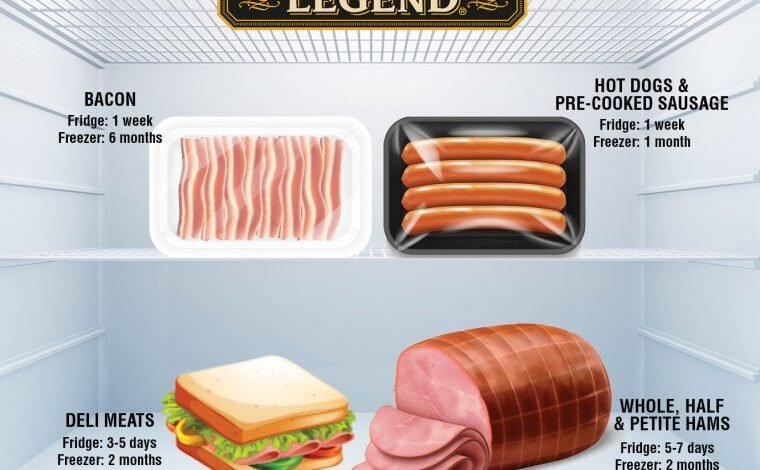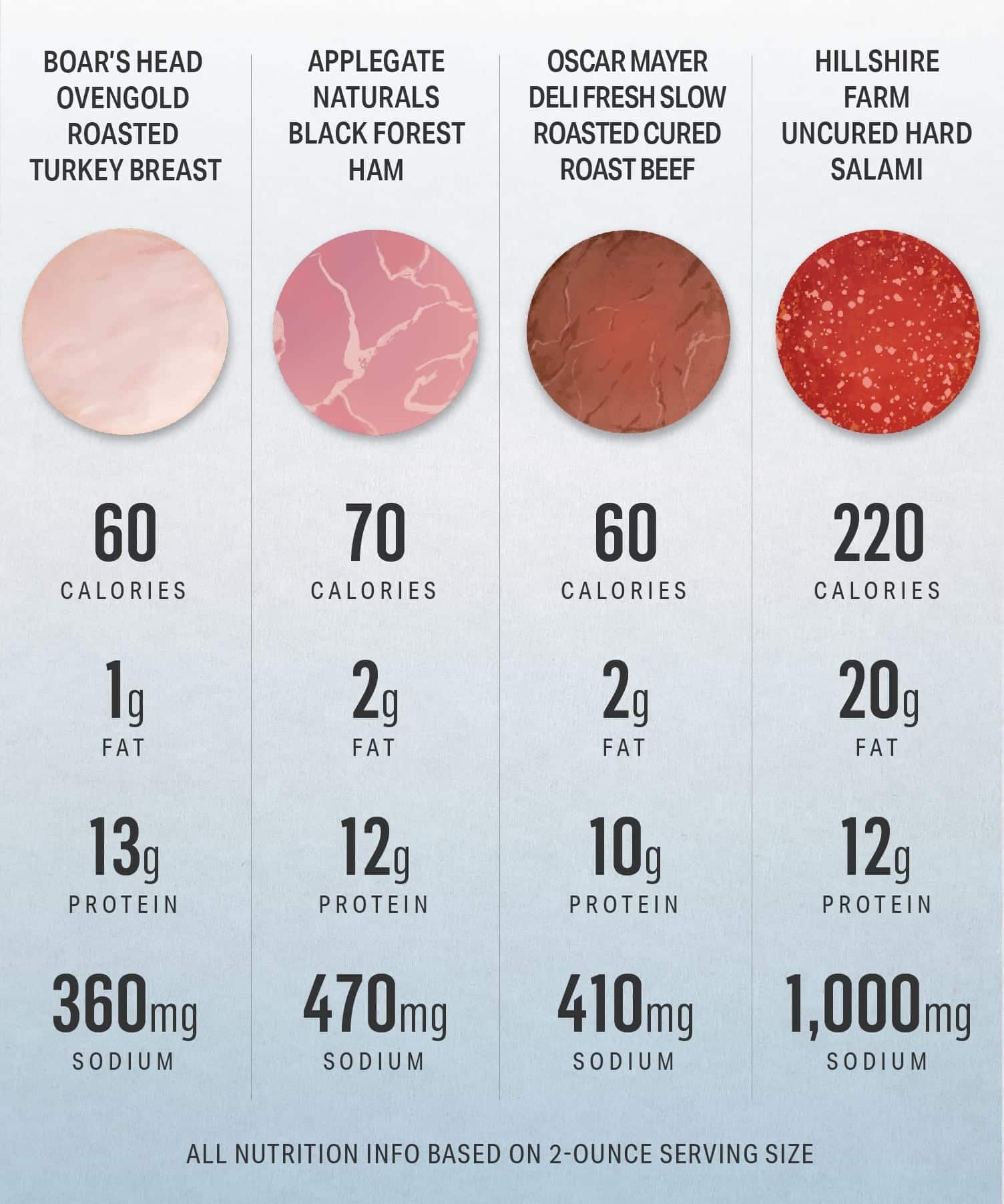How Long is Deli Meat Good for? Freshness Secrets Unveiled

How Long is Deli Meat Good for? Deli meat is good for up to 5 days in the refrigerator. Deli meat typically has a short shelf life and should be consumed within a few days of purchase to ensure freshness and prevent the growth of bacteria.
It is important to properly store deli meat in the refrigerator at a temperature below 40°F (4°C) to maintain its quality and safety. Keeping deli meat tightly sealed in its original packaging or in airtight containers can help prolong its freshness.
Regularly checking the expiration date and any signs of spoilage, such as an off odor or slimy texture, is crucial before consuming deli meat. By following these guidelines, you can enjoy deli meat safely and make the most of its shelf life.
The Lifespan Of Deli Meat
Deli meat typically stays fresh in the refrigerator for 3-5 days after opening. To prolong its lifespan, store it in airtight containers or freezer bags. Always check for any signs of spoilage before consuming.
Deli meat is a popular staple in most households. It is versatile, easy to prepare, and makes for a quick and delicious sandwich. However, it is essential to know how long deli meat lasts to avoid any potential health hazards. In this post, we will discuss the lifespan of deli meat, including the factors affecting freshness and the typical shelf life by type.
Factors Affecting Freshness
Several factors can affect the freshness of deli meat, including:
- Temperature: Deli meat should be kept at a temperature of 40°F or below to prevent bacterial growth.
- Exposure to air: Deli meat should be tightly wrapped to prevent exposure to air, which can cause it to dry out and spoil faster.
- Handling: Proper handling, such as using clean utensils and washing hands before and after handling, can prevent contamination.
- Storage time: Deli meat should not be kept in the refrigerator for more than three to five days.
Typical Shelf Life By Type
The shelf life of deli meat can vary depending on the type. Here’s a breakdown of the typical shelf life by type:
| Type | Shelf Life |
|---|---|
| Ham, turkey, chicken, roast beef | 3-5 days |
| Corned beef, pastrami | 5-7 days |
| Salami, bologna, pepperoni | 2-3 weeks |
It’s essential to keep in mind that the shelf life of deli meat can vary depending on the brand, preparation method, and storage conditions. Always check the expiration date and use your senses (sight, smell, and taste) to determine if the deli meat has gone bad. In conclusion, deli meat is a delicious and convenient food option, but it’s crucial to handle and store it properly to prevent any potential health hazards. By following the factors affecting freshness and typical shelf life by type, you can ensure that your deli meat stays fresh and safe to eat.
Credit: www.quora.com
Preservation Techniques
Preservation techniques play a crucial role in extending the shelf life of deli meat. When stored properly in the refrigerator, deli meat can stay fresh for up to five days. Proper packaging and temperature control are key factors in maintaining its quality.
Vacuum Sealing Benefits
Vacuum sealing deli meat extends shelf life.
Refrigeration Practices
Store deli meat in sealed containers in the fridge.
Signs Of Spoilage
Deli meat can spoil if not properly stored. Signs of spoilage include a slimy texture, a sour or off smell, and a change in color. It’s important to consume deli meat within a few days of purchase for optimal freshness.
Visual Clues
One of the easiest ways to determine if deli meat has spoiled is by examining its visual appearance. Look for any obvious signs of discoloration, such as a change in color from the original pink or red to a gray or greenish hue. Additionally, check for the presence of any mold or slime on the surface of the meat. These visual clues are strong indicators that the deli meat has gone bad and should not be consumed.
Odor And Texture Changes
The smell and texture of deli meat can also provide valuable information about its freshness. If you notice a strong, unpleasant odor coming from the meat, it is likely spoiled and should be discarded immediately. Similarly, if the texture feels slimy or sticky to the touch, it is a clear sign of spoilage. Fresh deli meat should have a mild, pleasant odor and a firm, slightly moist texture.
If you’re unsure about the freshness of the deli meat, it’s best to err on the side of caution and avoid consuming it. Consuming spoiled deli meat can lead to foodborne illnesses, such as food poisoning, which can cause symptoms like nausea, vomiting, diarrhea, and abdominal pain.
Proper Storage To Extend Shelf Life
To maximize the shelf life of deli meat and reduce the risk of spoilage, it’s crucial to store it properly. Here are some tips:
- Keep deli meat refrigerated at temperatures below 40°F (4°C).
- Store deli meat in airtight containers or resealable bags to prevent exposure to air and moisture.
- Consume deli meat within 3-5 days of purchase to ensure optimal freshness.
- If you don’t plan on consuming the deli meat within a few days, consider freezing it to extend its shelf life.
- Thaw frozen deli meat in the refrigerator, never at room temperature, to prevent bacterial growth.
By following these storage guidelines and paying attention to the signs of spoilage, you can enjoy deli meat safely and avoid any potential health risks associated with consuming spoiled food.

Credit: blog.myfitnesspal.com
Handling Deli Meats Safely
Deli meats are a popular choice for sandwiches, wraps, and salads. But, how long is deli meat good for? It’s crucial to handle deli meats safely to prevent the growth of bacteria, which can cause foodborne illnesses. In this article, we’ll discuss the proper handling and storage techniques for deli meats to ensure that they are safe for consumption.
Proper Slicing Methods
One of the essential steps in handling deli meats is proper slicing. Slicing deli meats can be tricky, but it’s crucial to do it correctly. Here are some tips:
- Use a clean, sharp knife to slice deli meat.
- Start by cleaning the deli meat before slicing it to remove any dirt or bacteria on the surface.
- Ensure that the slicer is clean and sanitized before using it.
- Keep the slicer at the appropriate temperature to prevent the growth of bacteria.
- Always slice deli meats to order to ensure freshness.
Cross-contamination Prevention
Cross-contamination is a significant concern when handling deli meats. It occurs when bacteria from one food item transfers to another. Here are some ways to prevent cross-contamination:
- Always wash your hands before and after handling deli meats.
- Use different cutting boards and utensils for raw meats and deli meats.
- Store deli meats separately from other foods in the refrigerator.
- Ensure that the packaging of the deli meats is not damaged or torn.
- Never use the same plate or container for cooked and raw deli meats.
In conclusion, handling deli meats safely is crucial to prevent foodborne illnesses. Following proper slicing methods and cross-contamination prevention techniques can help ensure that your deli meats are safe for consumption.
Impact Of Preparation Methods
When it comes to the shelf life of deli meat, the impact of preparation methods is a crucial factor to consider. How the meat is sliced and packaged, as well as the use of preservatives, can significantly affect its longevity and quality.
Sliced-to-order Vs Pre-packaged
Sliced-to-Order: Deli meat that is sliced to order tends to have a shorter shelf life due to increased exposure to air and potential bacterial contamination. However, the freshness and flavor are often superior.
Pre-Packaged: Pre-packaged deli meat is typically processed and sealed with modified atmospheres to prolong its shelf life. While it may not offer the same level of freshness, it generally lasts longer due to reduced exposure to air.
The Role Of Preservatives
Natural Preservatives: Some deli meats are preserved using natural ingredients such as salt and sugar, which can extend their shelf life while minimizing the use of artificial additives.
Artificial Preservatives: Many pre-packaged deli meats contain artificial preservatives such as nitrates and nitrites, which are effective at inhibiting bacterial growth and prolonging shelf life. However, there is ongoing debate about their potential health risks.
Storage Solutions
When it comes to deli meat, proper storage is essential to maintain its freshness and prevent the growth of harmful bacteria. By following the best practices for refrigeration and freezing, you can ensure that your deli meat stays safe to eat for as long as possible.
Best Practices For Refrigeration
Refrigeration is the most common method of storing deli meat. To keep your deli meat fresh and safe, follow these best practices:
- Keep your refrigerator temperature at or below 40°F (4°C) to slow down the growth of bacteria.
- Store deli meat in the coldest part of the refrigerator, such as the bottom shelf or meat drawer.
- Keep deli meat in its original packaging or transfer it to an airtight container or resealable bag.
- Make sure the deli meat is tightly sealed to prevent exposure to air, which can cause it to dry out.
- Label the container or bag with the date of purchase to help you keep track of its freshness.
- Consume deli meat within 3-5 days of purchase for optimal quality and safety.
- Inspect the deli meat before consuming it. If it looks or smells off, it’s best to discard it.
Freezing Deli Meats
If you have a surplus of deli meat or want to extend its shelf life, freezing is a viable option. Here’s how to freeze deli meats:
- Before freezing, divide the deli meat into smaller portions that you are likely to use in one serving.
- Wrap each portion tightly in plastic wrap or aluminum foil to prevent freezer burn.
- Place the wrapped portions in a freezer-safe bag or container.
- Label the bag or container with the date of freezing to keep track of its freshness.
- Store the deli meat in the coldest part of the freezer, such as the back or bottom.
- Deli meat can be safely stored in the freezer for up to 2-3 months.
- When ready to use, thaw the deli meat in the refrigerator overnight.
By following these storage solutions, you can maximize the shelf life of your deli meat and enjoy it safely for longer periods. Remember to always prioritize food safety and discard any deli meat that shows signs of spoilage.
Consumption Tips
Deli meat is generally good for 3-5 days when stored properly in the refrigerator. It’s important to check the “sell by” date and consume it within that time frame to ensure freshness and safety. Always follow storage guidelines and trust your senses to determine if the meat is still good to eat.
Ideal Serving Conditions
Store deli meat in the refrigerator at 40°F or below.
Consume within 3 to 5 days for optimal freshness.
Serve deli meat chilled for the best texture and flavor.
Pairings To Enhance Freshness
Pair deli meat with crisp vegetables for a refreshing crunch.
Combine with whole grain breads for added fiber.
Enhance taste with mustard or honey mustard sauces.
:max_bytes(150000):strip_icc()/cold-cut-sandwiches-getty-0523-58401acd04154ef9a67d37b1a53071e2.jpg)
Credit: www.marthastewart.com
Myths About Deli Meat Freshness
Common Misconceptions
1. Deli meat lasts indefinitely in the fridge.
2. Freezing deli meat resets its expiration date.
Truth Behind Shelf Life Extenders
1. Common misconception: Deli meat lasts indefinitely in the fridge.
Truth: Deli meat typically lasts 3-5 days in the fridge.
2. Common misconception: Freezing deli meat resets its expiration date.
Truth: Freezing can extend deli meat shelf life up to 2 months.
Frequently Asked Questions
How Long Can Deli Meat Last In The Fridge?
Deli meat can last for 3 to 5 days in the fridge if stored properly in an airtight container. Be sure to check the sell-by date and consume it within that time frame for the best quality and safety.
Can You Freeze Deli Meat For Later Use?
Yes, you can freeze deli meat for up to 1-2 months. To maintain its quality, wrap the deli meat tightly in plastic wrap or aluminum foil before placing it in an airtight container or freezer bag.
Is It Safe To Eat Deli Meat Past The Expiration Date?
It’s not recommended to consume deli meat past its expiration date. To ensure food safety, always adhere to the expiration date, and if in doubt, it’s best to discard the deli meat.
What Are The Signs That Deli Meat Has Gone Bad?
Signs that deli meat has gone bad include a sour or rancid smell, a slimy or discolored appearance, or an off taste. If you notice any of these signs, it’s best to discard the deli meat to avoid foodborne illness.
Conclusion
Understanding the shelf life of deli meat is crucial for food safety. By following storage guidelines and using your senses to assess its quality, you can enjoy deli meat safely and deliciously. Keep in mind the importance of proper handling and storage to make the most of your deli meat.





